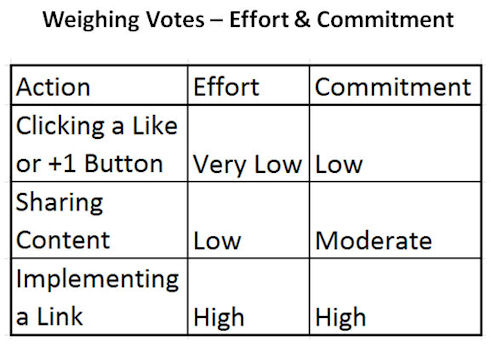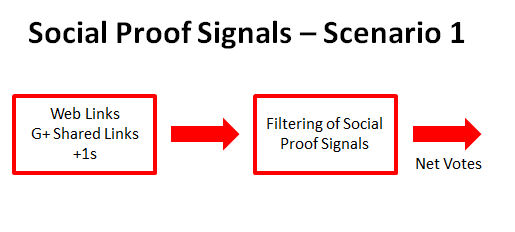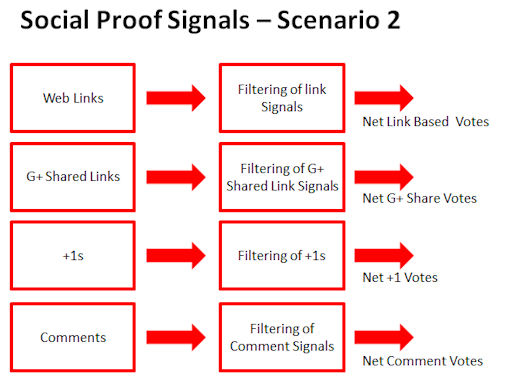What Everybody Missed About Hummingbird: Social Signals
Danny Sullivan joined me for a live broadcast event via a Hangout on Air (HOA) this past Halloween, and this included a major revelation about Hummingbird and Social signals. Scott Scowcroft has done an awesome job of extracting this part of the broadcast into a short, 5-minute HOA Nugget video (aka “The Scott Treatment”) for […]
Danny Sullivan joined me for a live broadcast event via a Hangout on Air (HOA) this past Halloween, and this included a major revelation about Hummingbird and Social signals. Scott Scowcroft has done an awesome job of extracting this part of the broadcast into a short, 5-minute HOA Nugget video (aka “The Scott Treatment”) for me, and you can watch it here:
[youtube]https://www.youtube.com/watch?v=OJZIg3WlL74[/youtube]
To summarize, it appears that Google previously had major technical limitations with regard to the use of social signals as a ranking factor. With Hummingbird, Google now has the infrastructure to better process social signals (among other things).
This might explain why the study I recently shared showed that Google+ share links did not impact ranking — but it may also hint that the day when Google Plus does impact rankings is just around the corner.
One of the great analogies that Danny drew during the HOA was the way voting worked in the early days of the United States. In order to vote, you had to be a white male that owned a substantial amount of property. Not really a democracy at all.
Over time, people of other races, those with less wealth, and women all obtained the right to vote. The country progressed over time to become one where, in principle, every citizen 18 or older has the right to vote.
Will This Democracy Happen With Search?
Simple answer: Yes and No. (Okay, I guess that was not a simple answer.) Let’s look at the landscape in a bit more detail.
Historically, SEO Has Been Driven By Links
This is the equivalent of the rich, white male landowners having the ability to vote and no one else. On the Web, to implement a link, you need to own a website. Even though that is not necessarily a huge investment compared to owning land, it is still some level of investment, and much more so than opening a social media account.
Google Will Use Social Signals As A Ranking Factor In The Future
To re-summarize my opening paragraphs, this suggests two things:
- Google is not using social signals now (or not using them extensively)
- They certainly intend to use them in the future
We Live In A World Of Spam
That’s just a reality. Some types of votes simply need to be discounted altogether. Related to this is the notion that you can’t vote for yourself. Anything you do that is voting for yourself should simply not count. You don’t get to do that.
The Vote Of A Subject-Matter Expert Should Count For More
If you have someone who is a widely recognized expert on a given topic, and they think someone has created great content for that topic, their opinion should count for more than someone who hasn’t got a clue. The link-based algo has always operated this way. It will also be this way with social signals.
Remember that links were the first form of social proof. It was just a way for people (in this metaphor, the rich, white male landowners) to vote for the best content. In the original Google algorithm, PageRank was an indicator of who the Subject-Matter Experts were, and higher PageRank links counted more than lower PageRank ones did. This also evolved over time, and relevancy became a big factor.
In the world of social media, Subject-Matter Experts can be recognized by the way their relevant content is cited, shared, +1’ed, etc.
Social Votes Require Less Effort & Commitment
While you can view the world in which only website owners get to vote (because only they can implement links) as not being truly democratic, the reality is that “voting” for content using links requires more effort and more commitment than sharing content socially does.
Putting aside crappy sites that have no authority, website publishers have a brand reputation to protect. If they link to a spammy affiliate site, their reputation with their own target audience will suffer. The same is true of a social media presence, but the difference is that a share on a social media site is often gone in minutes, whereas the link on a website is a static object (until removed).
In either scenario, there is a pretty good incentive to not link to really bad crap, but the real issue is the gray area. How much review will you put into qualifying a piece of content before sharing it via social media? If it looks pretty good, but you are running out of time and want to shove it out there, do you ever not spend that extra few minutes checking it out? Does the desire to be one of the first to share it override that last bit of caution? There are many scenarios that can influence caution and diligence.
The point is that there are gray areas, and the lower risk associated with a less-than-stellar share is low. On a website, the brand and reputation risk with a marginal linking decision is higher.
How Will This Shake Out?
I have only my speculation to offer you, but I’ve never been shy about that! I don’t believe it will look like this:
As I noted above, the investment people have in voting (sharing, +1s, comments) via social media is simply different than it is when you implement a link on a website. For that reason, they will be used in a somewhat different way. I think a better view of the way it will work is like this:
The point of the two diagrams is that I believe the method of filtering of social signals will be entirely different. I don’t think you will simply add social votes to link votes and be done with it. In all cases, there will be weighting based on the authority of the person/brand/publisher “voting” for content.
One part that is missing from the charts, though, is that the different signals could possibly impact rankings in quite different ways. You could even imagine links affecting ranking in certain types of scenarios, and social signals having no impact in those scenarios, and vice versa.
Summary
Both links and social signals are forms of social proof, but they have different aspects to how they work and what is involved. For that reason, I expect there will be differences in how they are applied by Google. Regardless, building your reputation across many platforms and getting lots of different types of social proof signals is the heart of online marketing these days.
For larger businesses, this operates at a large scale. For smaller businesses, this may focus on a niche market or a local market. Either way, the game is the same. Establish your reputation as a leader within the market space in which you reside. That is ultimately the goal. And, it appears that at long last Google is about to start counting those Google+ signals for something.
Editor’s Note: See also Danny Sullivan’s articles on the “link democracy” versus counting social shares:
Opinions expressed in this article are those of the guest author and not necessarily Search Engine Land. Staff authors are listed here.
Related stories
New on Search Engine Land


